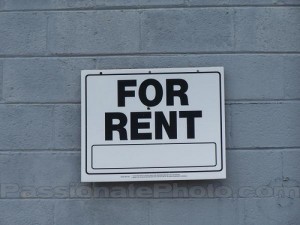Posted by Teresa on October 23, 2012 under Landlord Tips | 
 Perhaps you’re a new rental property owner, and you’re not sure how to go about managing your property. Or maybe you’re a successful landlord who is thinking about turning over the day-to-day management of your properties to a professional company. Perhaps you’ll even take it easy and enjoy some free time again.
Perhaps you’re a new rental property owner, and you’re not sure how to go about managing your property. Or maybe you’re a successful landlord who is thinking about turning over the day-to-day management of your properties to a professional company. Perhaps you’ll even take it easy and enjoy some free time again.
Whichever the case may be, hiring a property management company has its upsides—like no more tenant phone calls in the middle of the night. It also has its downsides. For example, no company will care for your property like you do.
Before you decide whether or not to hire a management company, here are some additional pros and cons to consider.
Pros and Cons of Hiring a Property Management Company
Property management companies are professionals and are experienced. Here are considerations that make it worth hiring one:
- You’ll spend less time working on (and worrying about) your rental properties.
- You’ll save travel time going to and from your properties.
- You will have the peace of mind that comes with not dealing directly with tenants for rent collection, complaints and other issues.
- Someone else will handle maintenance and repairs.
- They will determine the best rent, based on the market and what your property offers.
- A quality PM company will find the most qualified tenants.
- They have connections with lawn, snow removal and maintenance and other service companies, and can often procure services at better rates.
On the other hand, property management companies cost money, so before you hire one, take the following into consideration:
- You won’t have the advantages of hands-on, do-it-yourself management, such as seeing for yourself how things are going at your properties.
- You may not need all of the services provided by property management companies. For example, if your property doesn’t require a great deal of upkeep, you could be overpaying.
- A property management company may not feel as compelled as you would to keep your vacancies low.
- You will have to manage the property management company. This could take substantial time and effort.
- Do you have the extra cash every month to pay 8–10% of your income to a PM company?
For some landlords, hiring a property management company is an unnecessary expense. For others, the additional free time and decrease in stress makes it worth every penny.
What do you think? Do you prefer to manage your own properties or was hiring a professional company the best decision for you?
Posted by Teresa on March 23, 2012 under Landlord Tips | 
 If you have rental units to fill, you might want to put yourself in your potential tenants’ shoes, and give them what they want. So what do people look for when searching through apartment or rental home ads?
If you have rental units to fill, you might want to put yourself in your potential tenants’ shoes, and give them what they want. So what do people look for when searching through apartment or rental home ads?
Photos: You can’t have too many photos of your rental. Exterior and interior photos are a must for attracting the right tenant. And be sure the photos are done well. Use good lighting or bright, natural light. Be sure to show features like closets, dishwashers, laundry rooms, garages, patios and any attractive views.
Neighborhood: Describe the neighborhood, including the distance to grocery stores, pizza places, coffee shops and schools. If you’re close to a high-end neighborhood, but your rent doesn’t reflect it, say so.
Pets: More people have pets these days, and consider them part of the family. If you accept pets, say so right off the bat. Specify any limitations, such as size or type of pet (cats or reptiles, for instance), and whether you require pet references. And if you don’t allow pets, you should let people know that, too. Save phone calls, emails and headaches all around with complete information.
Rules: You can weed out less-than-desirable prospects by stating any application requirements in your ad, like fees, proof of income, credit and tenant screening checks, and references.
Just be sure to treat all applicants equally and fairly to avoid any question of discrimination. The Fair Housing Act prohibits discrimination in housing on the basis of race, color, national origin, religion, gender, family status or handicap.
Posted by Teresa on October 11, 2011 under Housing Trends, Rental Market | 
 A new survey focusing on baby boomers and their home buying plans was released today by Coldwell Banker Real Estate. The survey of 1,300 agents and brokers finds that 87% of respondents have clients who already own or are looking to buy investment property. About 22% of agents responding said that at least half of their baby boomer clients fall into this category.
A new survey focusing on baby boomers and their home buying plans was released today by Coldwell Banker Real Estate. The survey of 1,300 agents and brokers finds that 87% of respondents have clients who already own or are looking to buy investment property. About 22% of agents responding said that at least half of their baby boomer clients fall into this category.
Jim Gillespie, CEO of Coldwell Banker Real Estate, said that baby boomers drive the U.S. economy; while they are a diverse group and cannot be generalized, their attitudes towards real estate can be telling. Right now, the economy is delaying boomers’ decisions to sell their existing homes, whether to downsize or relocate.
Coldwell Banker Real Estate’s data indicates that the boomers who can afford to are looking for a retirement home or a second home for investment, and many see now as the time to take advantage of lower home prices.
Additional survey findings:
- Younger baby boomers (ages 47 – 55) are more interested in purchasing a second home than older baby boomers (ages 56 – 64), by a margin of 34% to 22%.
- 31% of younger baby boomers are looking to sell an existing home and buy a larger home, compared to just 6% of the older group.
- Downsizing is more appealing to older (80%) than younger (52%) boomers. For the majority of older boomers, the reason for downsizing is not to save money, but to simplify their lives.
Interest rates are historically low, so younger baby boomers are actively seeking income streams for retirement. Perhaps they will be joining the ranks of the nation’s landlords, trading fixed annuities and bank CDs for property management guides and a set of handyman tools.
Posted by Teresa on September 17, 2011 under Lease and Rental Agreements | 

Dealing with tenants who want to break a lease early doesn’t have to be unpleasant. Experienced landlords often offer tenants a buy-out agreement as a way to compensate them for the trouble of a breaking the lease.
You can set the conditions of the buyout according to your needs. For example, you can release your tenant from the lease and any remaining rent obligations, in exchange for a fee. While the fee does not affect the tenant’s obligations for any property damage (any security deposit paid by the tenant is a separate matter), it can compensate you for your time and trouble in finding a replacement tenant, plus your advertising expenses and possible loss of rental income while undergoing the process.
Be sure that the terms and conditions of the buy-out agreement are clearly spelled out in a document that will be signed by you and all tenants listed on the original lease agreement. Include the dollar amount of the fee, which might equal one, two or three months’ rent, along with the date the property will be vacated, and other details concerning property inspection, key return, security deposit, and forwarding address information. It’s a good idea to have all of your lease and agreement documents reviewed by a landlord/tenant attorney.
The amount of the fee should cover the loss of rent for the time you expect it will take to re-lease the property, advertising expenses and any other costs related to the tenant terminating the lease.
Legal disclaimer:
The contents of this article are intended for general information purposes only, and should not be relied upon as a substitute for obtaining legal advice applicable to your situation.
Posted by Teresa on August 10, 2011 under Landlord Tips | 
 When you become a landlord, it’s not easy to figure out the best way to approach every problem. You’re bound to make mistakes (otherwise known as “learning opportunities”). Following these 8 tried-and-true tips from other successful rental property owners can make it easier for you to avoid making common errors.
When you become a landlord, it’s not easy to figure out the best way to approach every problem. You’re bound to make mistakes (otherwise known as “learning opportunities”). Following these 8 tried-and-true tips from other successful rental property owners can make it easier for you to avoid making common errors.
- Remember you’re in the people business. Providing good service to your tenants is part of your job. If you’re shy, or don’t deal well with a wide variety of personalities, you may not find success as a landlord.
- One way to provide good service is to respect your tenants’ privacy. Always provide notice before you enter their units. The minimum is at least 24 hours; more may be required by your local or state laws.
- Don’t ever allow a tenant to move in until the rental agreement is signed and the first month’s rent and security deposit are paid.
- Don’t allow a tenant to move in until a background check, credit check and reference checks are completed.
- Keep up with maintenance and repairs, or they can get out of hand—and even become a hazard. If not repaired promptly, a loose board on a stairwell can lead to injury or even a tragic situation.
- When tenant disputes come up—as they invariable will—try to resolve them through good communication first. If an agreement cannot be reached, you might try mediation. Mediators are neutral third parties who make sure both sides’ issues are heard, and assist you in reaching an agreement both sides can live with.
- It’s important to put your tenants’ health and welfare first. Disclose hazards, such as lead paint, according to the law. Take care of water leaks, which can lead to mold. Address any insect or rodent problems immediately. And always make sure that door and window locks are easy to operate, fire escapes are accessible and smoke and CO2 detectors are in place and operating.
- Keep good records. Every piece of correspondence with a tenant is valuable. You never know when you’ll need proof of a payment, a notice or a conversation.
Posted by Teresa on July 19, 2011 under Landlord and Tenant FAQs, Screening and Background Checks | 
 Landlords approach apartment or rental house rehabs differently. Some think that no matter what they do, tenants will damage their rental property, so there is no reason to upgrade or make it look nice.
Landlords approach apartment or rental house rehabs differently. Some think that no matter what they do, tenants will damage their rental property, so there is no reason to upgrade or make it look nice.
Other landlords invest in major improvements to their properties in order to charge higher rents and attract higher-income tenants. Still others make small improvements each time a tenant moves out, to slowly but surely increase the appeal and attract the best tenants.
There is no right or wrong approach – just the one that works for you. Here are some pros and cons to each approach:
Leave Your Rental Property as Is and Make No Improvements
Pros:
- You save money.
- You can turn over the rental to a new tenant more quickly.
- You avoid the possible frustration of seeing improvements damaged or ruined by tenants.
Cons:
- You probably won’t be able to increase rents unless vacancy rates decline.
- You could easily find your rental property losing value.
- You may attract only tenants who are okay with living in less-than-attractive housing.
Invest in a Major Rental Rehab
Pros:
- The result is usually worth the effort.
- You can often charge a premium rent to increase your return on investment.
- You can attract more desirable tenants.
- The value of your rental property may increase.
Cons:
- Remodeling can be very expensive.
- There is no guarantee your work will be valued or respected by tenants.
- Your rental property value may not increase, due to current market conditions.
Make a Few Improvements Each Time a Tenant Moves Out
Pros:
- Your investment is spread out over time.
- You may increase the value of your rental property.
- You can gradually improve the quality of tenants your attract.
Cons:
- It can take much longer to see real improvements.
- You may not keep up with the market at a slower pace.
- There is risk in subjecting your property to less desirable tenants for a longer period of time.
Remember, attracting desirable tenants is a worthy goal, but it’s not for every landlord. If you’re fine with minimum investment in your rental property, just beware of starting down the slippery slope to slumlord status!
No matter how nice your rental property is, you can’t be sure that tenants are going to keep it that way. Minimize your risk by conducting tenant credit screening and tenant criminal background checks.
Posted by Teresa on June 28, 2011 under Landlord Tips, Lease and Rental Agreements | 
 It’s summer, and that means plenty of moving action in student housing. Turning over apartments and multi-room rental houses, summer moves home and new students moving in make it a busy time of year. With room and board fees increasing 6.5% each year, on top of skyrocketing tuition, many parents are looking for student rentals as on-campus housing alternatives.
It’s summer, and that means plenty of moving action in student housing. Turning over apartments and multi-room rental houses, summer moves home and new students moving in make it a busy time of year. With room and board fees increasing 6.5% each year, on top of skyrocketing tuition, many parents are looking for student rentals as on-campus housing alternatives.
If you own a rental property in a college town, you may be thinking about whether or not to lease it to college students. Here are some pros and cons for you to consider when making your decision:
PROS of Renting to College Students
- Parents typically pay the rent, on time, every month. (Maybe they don’t want their kid moving back home!)
- Students are often willing to pay top dollar, since living close to campus is highly desirable.
- Grad students and med students are often quiet, clean and too busy to make much of a mess.
- Students don’t typically break leases—they’re too busy during the school year to move.
CONS of Renting to College Students
- They are messy. They can be VERY messy.
- Zoning laws often preclude renting to more than a couple of unrelated individuals—be sure to check the laws in your area.
- Student rentals may require more repairs, repainting and other maintenance during and after the lease.
- Students like to party. Not all of them, certainly—but they can get a little crazy trying their new freedom on for size.
Tips from Landlords With Experience Renting to Students
- Be sure your lease is ironclad and more detailed than you may think it needs to be. Consider higher maintenance and repair costs when establishing the rent and security deposit.
- Establish noise limits and inform students that neighbor complaints will be dealt with severely.
- Always have parents co-sign the lease: at least one parent for each student-tenant.
- Don’t allow anyone who is not on the lease to stay in the rental unit. Temporary visitors tend to turn into unscreened tenants.
Student rentals can be lucrative, but do require a firm management style and frequent communication. Many landlords love renting to students and have no problems, especially when they are properly screened before the lease is signed.
Posted by Teresa on May 20, 2011 under Landlord Tips | 
 Many landlords and probably all property managers would agree that managing rental property is a full-time job. If you’re a busy rental property owner, you may have considered hiring a property management company or an individual property manager.
Many landlords and probably all property managers would agree that managing rental property is a full-time job. If you’re a busy rental property owner, you may have considered hiring a property management company or an individual property manager.
Here are four questions to ask yourself when considering if you’ll continue to manage properties on your own or hire some help:
- Have you added new rental properties? If you started with just one property, or less than a couple of units, for example, you may feel you can handle all the duties that come with managing rental property. Collecting rent, interviewing potential tenants, handling maintenance and repairs, and all the associated paperwork are just a few of the regular tasks required of property managers.
But if you’ve purchased additional properties to increase your income, you may find that it’s just too much to handle all these duties on your own. You may need an experienced manager to help you do it well—and keep you from losing time and money by doing it not-so-well.
- Do you feel like you always need more time? There is a lot you can do with the extra time that hiring a property manager could bring. Take care of your own home. Exercise more. Spend more time with your family. Read a book and actually relax. Life is short, and time is precious. Think about the benefits that paying for professional property management will bring to your life.
- Is your rental property in another city or distant state? It’s probably in your best interests to have someone nearby managing your rental property. Managing from afar can lead to damage to your property, criminal activity, and a host of other problems that you’ll not hear about because you’re not there.
- Are you having trouble dealing objectively with tenant problems? After managing your own rental property, you may no longer be able to be completely objective and business-like with tenants. Keeping control and getting problems solved is a property manager’s job. They don’t own the property, so they don’t have the same emotional connection.
The right property manager can make a big difference in your cash flow, because they take care of issues that affect it. They fill vacancies, find the best tenants, and perform all maintenance and accounting. If it’s time for you to hire one, just make sure you choose a property management company that is squarely on your side.
Posted by Teresa on April 1, 2011 under Landlord and Tenant FAQs | 
 Question: A landlord accepts applications from three potential roommates for a three-bedroom rental unit. The first two check out fine. The third proves to be difficult and unpleasant, even borderline verbally abusive, in all her interactions with the landlord. He decides to not even order a tenant credit report and rejects all three applicants. Is the landlord allowed to refuse a tenant for reasons other than a credit score?
Question: A landlord accepts applications from three potential roommates for a three-bedroom rental unit. The first two check out fine. The third proves to be difficult and unpleasant, even borderline verbally abusive, in all her interactions with the landlord. He decides to not even order a tenant credit report and rejects all three applicants. Is the landlord allowed to refuse a tenant for reasons other than a credit score?
Answer: Of course. A landlord may decline an applicant for any reason other than those covered under the Fair Housing Act, which bars discrimination based on race, color, national origin, religion, sex, familial status (including children under the age of 18 living with parents or legal custodians), pregnant women, elderly people, people securing custody of children and handicap (disability).
A landlord does not have to disclose reasons for rejecting a tenant—you can simply say a more qualified applicant was approved. (Under the Fair Credit Reporting Act or FCRA, a letter must be sent to an applicant if credit is declined, including for rental housing)
Question: A landlord advertises a rental property using the following language:
For Rent. 3BR apartment, 3rd floor. Not suitable for kids or elderly.
Is this discriminatory?
Answer: Yes. See above: landlords may not deny housing based on family status or age. This landlord could get in big trouble for this type of ad.
Question: A landlord starts eviction proceedings after discovering a tenant has kept a cat in her apartment—contrary to the lease, which states no animals are allowed. The tenant tells the landlord that she needs the cat because it is a therapy animal. Is the landlord discriminating against the tenant based on a disability?
Answer: It often depends on where the rental property is located. In most areas, a tenant must provide proof that the therapy or companion animal is necessary for the individual’s mental health or stability. This is usually a statement by a medical provider. The Americans with Disabilities Act (ADA) does not include companion, emotional support or therapy animals, because they have not been trained to perform tasks that benefit a disabled person.
Posted by Teresa on March 11, 2011 under Tenant Credit Checks | 
 What should a landlord do when a potential tenant states they have had their credit report pulled recently and therefore, there’s no need to run another credit report for their lease application? Should they accept the applicant’s report and save the time and trouble?
What should a landlord do when a potential tenant states they have had their credit report pulled recently and therefore, there’s no need to run another credit report for their lease application? Should they accept the applicant’s report and save the time and trouble?
In a word: no. Some tenants might be trying to save money and might not see the need for another credit report. Or, they may want you to know up front that their credit score is low; in this case you can make a decision to continue with your own report or reject their lease application.
And then there are those who fabricate their own credit reports, which happens every day to landlords and others who aren’t as cautious as they should be. Fake credit reports are widely available, so don’t make the mistake of accepting any credit report other than one from a trusted service provider.
Smart landlords don’t run their rental property business on guesswork. To really know who you’re renting to, always reinforce your policy that a credit and background check will be conducted on every tenant applicant.
If, after hearing you won’t accept their credit report, the potential tenant is no longer interested in your rental property, you might have dodged a bullet.
Of course, there are exceptions to every rule! In some states, landlords must accept a potential tenant’s credit report if it is no older than 30 days. Other states have legislation that a credit bureau must forward an existing credit report whenever the tenant applies for a lease within 30 days. These laws are designed to prevent tenants from incurring high fees from repeated applications.
Landlords have the right to protect their business interests by leasing to qualified tenants. Make sure yours are qualified by conducting a thorough credit and background check on each one–even if they have one in their pocket for you!
 Perhaps you’re a new rental property owner, and you’re not sure how to go about managing your property. Or maybe you’re a successful landlord who is thinking about turning over the day-to-day management of your properties to a professional company. Perhaps you’ll even take it easy and enjoy some free time again.
Perhaps you’re a new rental property owner, and you’re not sure how to go about managing your property. Or maybe you’re a successful landlord who is thinking about turning over the day-to-day management of your properties to a professional company. Perhaps you’ll even take it easy and enjoy some free time again.







